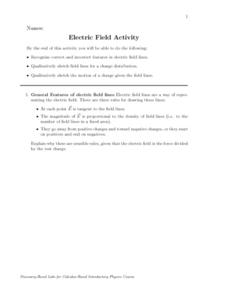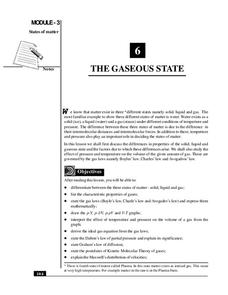Curated OER
Electric Field Activity
For this physics worksheet, students identify and describe the correct and incorrect features in electric field lines. Then they qualitatively sketch field lines for a charge distribution and a charge given the field lines.
Curated OER
Properties of Soil: Original Lesson Plan
This lesson is an investigation of soil properties, particularly texture, color and space for air and water. Student inspect soil samples found in their locale, perform several tests to determine different properties, and involves a ...
Curated OER
Locating Patterns of Volcano Distribution
Students examine patterns of volcanic distribution worldwide, use tables to plot and label location of each volcano on map, lightly shade areas where volcanoes are found, and complete open-ended worksheet based on their findings.
Curated OER
Sampling and Comparing Biodiversity
Students compares the density and distribution differences of four species of spiders in two hypothetical habitats. They "sample" two habitats and then do calculations such as average density and relative distributions to compare the...
Curated OER
Ocean Currents
Students label the names, relative temperature, distribution, and direction of flow of major ocean currents on a world map. They also explore and model the natural forces that affect the movement of ocean currents through demonstrations...
Teach Engineering
Start Networking!
Class members create their own social networks by collecting signatures before graphing the interactions with their fellow classmates. The degree distribution of the simulated social network is determined by calculating the degree of...
Curated OER
Unit 2: Global to Local: Understanding My Place in the Hydrosphere
What does the ground around your home have to do with water pollution? Young ecologists learn about their local watershed and create their own cause-and-effect models of the hydrosphere.
National Nanotechnology Infrastructure Network
Silver and Bandages: Assessment of Inhibition of Bacteria by Silver Colloid-Impregnated Bandages
Silver: more than jewelry, it's also a natural antimicrobial agent. An inquiry-based lesson asks collaborative groups to design and implement an experiment to test this property. Using samples of silver nanoparticles and a strain of...
It's About Time
Volcanic History of Your Community
Did you know there are 20 volcanoes erupting at any given time? Pupils look at various igneous rocks, read local geologic maps, and determine if their area has a history of volcanic activity. A reading passage and analysis questions...
California Academy of Science
Coincidental Colonization
The Galápagos Islands are an amazing place of isolated adaptation, colonized by an interesting mix of plants and animals. The class plays a game to help them understand how these organisms came to live on the island through a combination...
American Chemical Society
The Discovery of Fullerenes
Carbon is the most common element on earth, so the innovative discovery of a new type of carbon molecule won the 1996 Nobel Prize. In the ready-to-go lesson, scholars learn about C60 and how it has opened up the entire area of...
Curated OER
Physical and Chemical Changes
Sixth graders complete several experiments about chemical and physical changes. In this physical and chemical science instructional activity, 6th graders complete 6 experiments about chemical and physical changes. Students examine the...
Curated OER
Spring Collecting and Identifying Bumble Bees
Students collect bumble bees in the field, record data, pin and label specimens, answer conclusion questions, and send specimens to research leaders for verification. They improve their ability to work in research teams. Students...
Curated OER
What in Our World Affects the Way People Live
Sixth graders study various maps that show geographical features and population. They compare the maps and make inferences about how various geographical features influence the population and human activities of an area.
American Chemical Society
Joseph Priestley, Discoverer of Oxygen
Do you want to hear a joke about nitrogen and oxygen? NO. We all know there is oxygen in the air and that plants produce oxygen, but how was it discovered? Scholars read a handout, answer questions, and analyze material in the...
Curated OER
Where Growth Meets Growth
Students discuss fire risk factors for a property located near a wildland area. For this science lesson, students identify, number, and provide reasons for areas of increased risk on a worksheet they think should be changed. Students...
National Institute of Open Schooling
The Gaseous State
Sixth in a series of 36, this lesson focuses on gases and their behavior in given situations. Learners review the states of matter and then focus on gases, specifically learning Boyle's, Charles's, Avogadro's Laws, Dalton's, and Graham's...
Curated OER
How Many Trees Can You Grow?
Young scholars solve a story problem about how many trees can be planted in a given area. Using a map, they gather information about the size of the area and the dimensions of an acre. They use a specific equation to determine the area...
American Chemical Society
Colors Collide or Combine?
As part of a unit investigating the dissolving of M&Ms® candy coating, this lesson examines whether or not the different colors combine. There are no new concepts revealed in this particular lesson, but learners will see that the...
Curated OER
Fire Wars
Students identify fire risk factors for a property located near a wildland area. Students discuss ecosystems subject to wildland fire and consider what could be done to eliminate the problem.
Curated OER
Polar Day: Living in the Canadian North
Students study the Canadian North. In this Canadian North lesson plan, students study the physical characteristics and the lifestyles of people in that region. Students complete map making and creative activities that help them learn...
Curated OER
Sound - Lesson Plan
Tenth graders should know how sound is produced and state some properties of sound.
Discovery Education
Sonar & Echolocation
A well-designed, comprehensive, and attractive slide show supports direct instruction on how sonar and echolocation work. Contained within the slides are links to interactive websites and instructions for using apps on a mobile device to...























